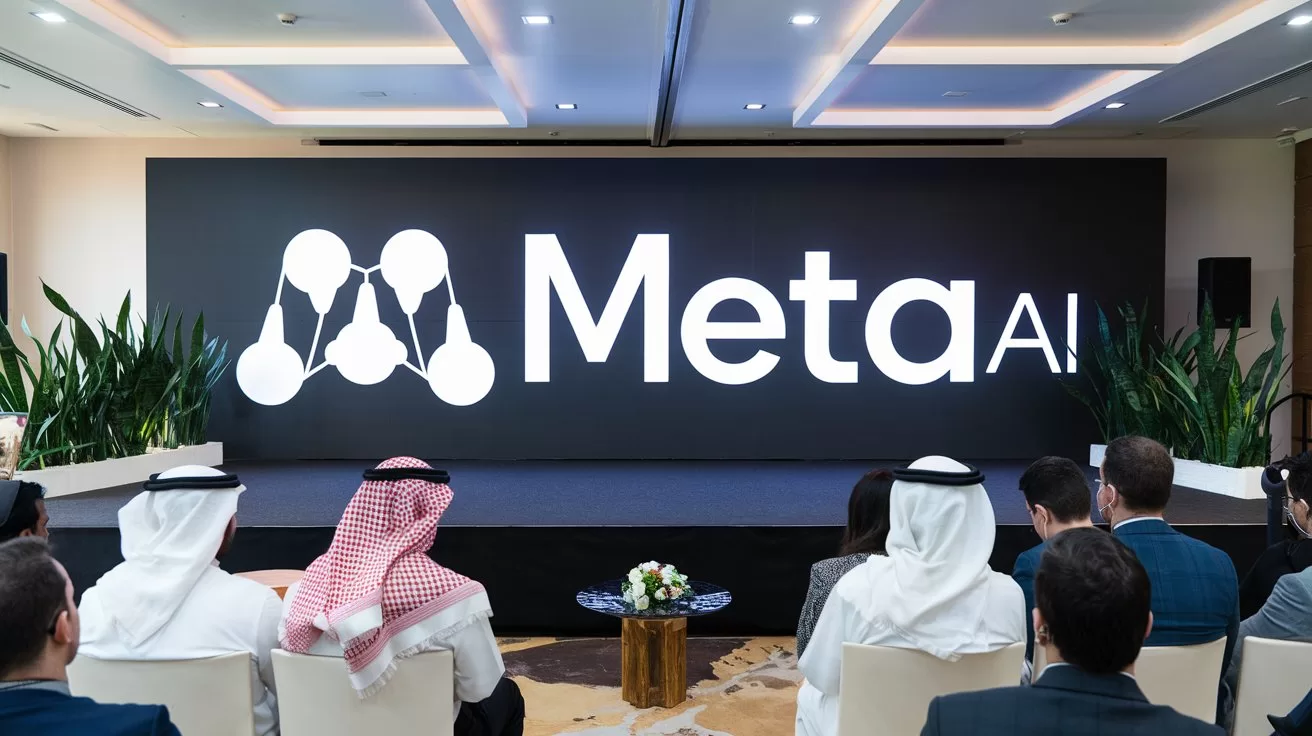News
Meta AI’s Strategic Leap: Expansion into MENA
Discover how the Meta AI MENA expansion transforms Arabic-language AI, tackles data privacy challenges, and reshapes the future of tech in the region.
Published
4 months agoon
By
AIinAsia
TL;DR – What You Need to Know in 30 Seconds
- Meta AI MENA Expansion: Seamless integration into Facebook, Instagram, WhatsApp, and Messenger across key MENA markets.
- Arabic Language Support: Llama 3.2 enables real-time text, image generation, and animations in Arabic.
- Privacy Concerns: Users can’t universally opt out of data usage, raising questions about regulation and trust.
- Future Features: Expect real-time photo edits, “Imagine Me” portraits, and enterprise integrations.
Meta AI MENA expansion
Hello lovely readers! Gather ’round for the latest scoop on AI developments in Asia (and beyond). Today, we’re chatting about Meta AI’s big move into the Middle East and North Africa (MENA) region. There’s plenty to cover, from Arabic language integration and new features to privacy concerns and a performance comparison with other AI assistants. So, pop the kettle on, get comfy, and let’s dive in!
1. Meta AI Expands into MENA: A New Chapter in Regional AI Accessibility
Overview of the Rollout
Meta has significantly expanded the reach of its AI assistant, Meta AI, unveiling it across the MENA region with dedicated Arabic support—an exciting milestone for AI accessibility. The rollout began in early February 2025, targeting five key markets first (the UAE, Saudi Arabia, Egypt, Morocco, and Iraq) with planned expansions to Algeria, Jordan, Libya, Sudan, and Tunisia soon.
And guess what? There’s no need to fill out lengthy registration forms or download extra apps. Meta AI is seamlessly integrated into Facebook, Instagram, WhatsApp, and Messenger, activated via a rather charming blue circle icon or by typing “@Meta AI” in group chats. It performs a range of tasks, from trip planning to general research.
Key Features and Arabic Integration
Meta AI harnesses Llama 3.2, Meta’s open-source language model, for text generation, real-time image creation, and animation. Users can simply type prompts like “Imagine a tiger wearing a vest drinking tea at a café” to generate visuals—talk about futuristic!
A particularly exciting development is the dedicated Arabic support, crucial in a region where over 400 million people speak the language. This localisation even considers dialects and cultural nuances, though do note some initial hiccups on iOS devices in certain areas.
Personalisation and Regional Impact
If you’re wondering how Meta AI seems to know you so well—it’s because the assistant uses data from your Facebook and Instagram profiles (location, interests, and viewing history) to tailor recommendations. So if you’re all about family-friendly country music events (no judgement), Meta AI might pop up with a recommendation or two based on your Reels habit.
Fares Akkad, Meta’s Regional Director for MENA, has dubbed Meta AI a “gateway to a smarter, more connected life for millions in the region”. Bold words, indeed!
Future Updates and Educational Initiatives
On the horizon, Meta promises some fun updates:
- “Imagine Me”: Personalised, editable AI-generated portraits.
- Real-time image editing: Add or remove elements from photos with ease.
- Simultaneous Reels dubbing: Automatically translate and lip-sync video content.
To ensure users make the most of these features, Meta has launched “Elevating Every Moment”, a content series with regional creators like Yara Boumonsef and Amro Maskoun, showing off practical uses—from art projects to travel planning.
Market Context and Challenges
AI investment in the MENA region is expected to skyrocket from $4.5 billion in 2024 to $14.6 billion by 2028. However, it’s not all smooth sailing. Meta faces concerns about data privacy, especially since some users can’t opt out of personalisation features.
Also, businesses are still on hold—no direct enterprise access to Meta AI just yet, though Meta may explore these integrations down the line.
Global Reach and Competition
Meta AI now boasts 700 million monthly users spanning 42 countries and 13 languages. This widespread reach puts Meta in the running to become the world’s most-used AI assistant by 2025. Naturally, competitors like Google’s Gemini and OpenAI aren’t sitting idle, especially in regions keen on Arabic-language AI solutions.
Conclusion: Balancing Innovation and Trust
Meta’s foray into MENA underscores a strong commitment to democratising AI—from seamless integration with social apps to prioritising Arabic-language support. However, the real test will be balancing cutting-edge innovation with privacy and user trust, particularly as regulatory frameworks in the region continue to evolve.
2. Meta AI’s Approach to Data Privacy in MENA: A Closer Look
Now, let’s talk about the elephant in the room: data privacy. Meta AI’s expansion across MENA naturally raises questions about how and where user data is stored, accessed, and utilised. Here’s the lowdown:
Data Usage and Consent Framework
- Public Data Training: Meta AI trains its models using public posts from Facebook and Instagram, plus licensed data. Private messages are off-limits for training.
- Opt-Out Limitations: While the EU and Brazil enjoy regulatory structures that mandate opt-in consent, MENA users often lack universal opt-out mechanisms. Meta’s global stance treats publicly shared content as fair use unless local laws say otherwise.
Regional Compliance Efforts
- UAE’s PDPA Alignment: In the UAE, Meta aligns with the 2022
- Personal Data Protection Law, which flags AI-driven data processing as “high-risk”. Additionally, Dubai’s financial regulators emphasise ethical AI in updated 2023 regulations.
- Watermarking and Metadata: To tackle deepfake worries, Meta embeds invisible markers in AI-generated images, aiding in authenticating synthetic content.
Infrastructure and Technical Safeguards
- Privacy Aware Infrastructure (PAI): Meta’s global system enforces purpose limitation, restricting data access in real time.
- Sensitive Data Handling: Meta claims it can’t always distinguish between sensitive and non-sensitive data9. However, it avoids using such categories for personalised AI outputs in MENA.
Criticism and Challenges
- Regulatory Scrutiny: MENA’s AI regulations (e.g., Saudi Arabia’s National Data Management Office guidelines) aren’t as ironclad as GDPR2930. Critics argue Meta exploits these inconsistencies.
- Third-Party Sharing Risks: Meta’s policy allows sharing anonymised data with unspecified “third parties,” prompting concerns about re-identification.
Future Commitments
Meta pledges cooperation with MENA regulators to align practices with emerging frameworks like Qatar’s 2024 AI Ethics Guidelines and Egypt’s draft Data Protection Act. That said, enterprises in MENA can’t yet tap into Meta AI’s business tools, so commercial privacy issues remain somewhat contained.
Key Takeaways
- Transparency Gaps: Users in MENA get less detail on how their data is used compared to those under stricter regulations.
- Localised Safeguards: Watermarking helps counter misinformation, but opt-out mechanisms are still lagging.
- Regulatory Evolution: As MENA countries up their game in AI governance (e.g., UAE’s AI Strategy 2031), Meta’s compliance strategies will face tighter oversight.
In short, while Meta AI’s MENA rollout is big on innovation, privacy remains a work in progress. Striking the right balance between global standards and regional nuances is crucial to building trust with local users.
3. Meta AI’s Performance in the MENA Region: Where It Stands
Finally, let’s compare Meta AI to its AI assistant peers in the MENA market. Is it the crème de la crème or does it still have some catching up to do?
Accessibility and Integration
- Widespread Reach: Meta AI’s biggest advantage is that it’s built into your everyday social apps—Facebook, Instagram, WhatsApp, and Messenger. No separate sign-up required!
- Market Availability: Already live in the UAE, Saudi Arabia, Egypt, Morocco, and Iraq, with expansions on the horizon.
Compared to standalone assistants, this deep integration makes Meta AI super convenient, likely boosting early adoption figures.
Functionality and Capabilities
- Image Generation: The “Imagine” feature allows real-time image creation and animation. A fun, creative twist!
- Language Processing: Powered by Llama 3.2, enabling robust text understanding.
- Arabic Support: Meeting the linguistic needs of 400+ million Arabic speakers.
However, let’s not forget the limitations:
- Accuracy Issues: Occasional misfires (or “hallucinations”) can require more user prompts.
- Research Capabilities: Even with Google and Bing integration, sources aren’t always current or relevant.
Market Position
Let’s talk competition:
- Google Assistant and Apple’s Siri are already well-established, often boasting more refined user experiences.
- Local Initiatives inspired by the UAE’s AI Strategy 2031 could spawn homegrown AI solutions.
Privacy and Data Handling
Meta’s data usage in MENA is under the microscope:
- Profile-Based Personalisation: Utilises your Facebook and Instagram data.
- Retention of AI Chat Data: Could be a stumbling block for privacy-minded users.
Future Outlook
- Upcoming Features: Simultaneous Reels dubbing, real-time image edits, etc. promise richer user experiences.
- Business Integrations: Meta is eyeing enterprise solutions down the line.
- Growing AI Market: MENA’s AI spend will likely jump from $4.5 billion in 2024 to $14.6 billion by 2028.
All told, Meta AI boasts an edge in accessibility and creativity but faces stiff competition and a few early performance wobbles. Its eventual success will hinge on refining its language capabilities, accuracy, and compliance with evolving MENA data rules.
Final Thoughts
So there you have it, folks! Meta AI is making waves in MENA, aiming to revolutionise digital interaction with Arabic language support and nifty features like real-time image creation. While it’s off to a good start—thanks to seamless integration across Meta platforms—the journey ahead is fraught with privacy concerns, regulatory scrutiny, and established competitors like Google and Apple.
As MENA’s AI regulations tighten and local appetite for AI surges, Meta AI must strike a delicate balance between innovation and user trust. We’ll be keeping a close eye on new features, expansions, and policy updates—so stay tuned to AIinASIA for all the latest!
What Do YOU Think?
Will Meta AI’s rapid expansion in MENA revolutionise daily life—or kickstart a privacy reckoning that reshapes AI policy for the entire region? Let us know in the comments below.
Let’s Talk AI!
How are you preparing for the AI-driven future? What questions are you training yourself to ask? Drop your thoughts in the comments, share this with your network, and subscribe for more deep dives into AI’s impact on work, life, and everything in between.
You may also like:
- Apple and Meta Explore AI Partnership
- Adrian’s Arena: AI and the Global Shift – What Trump’s 2024 Victory Means for AI in Asia
- The AI Age is Here—But Can You Ask the Right Questions?
- Or try Meta AI by tapping here.
Author
Discover more from AIinASIA
Subscribe to get the latest posts sent to your email.
You may like
News
If AI Kills the Open Web, What’s Next?
Exploring how AI is transforming the open web, the rise of agentic AI, and emerging monetisation models like microtransactions and stablecoins.
Published
1 week agoon
May 28, 2025By
AIinAsia
The web is shifting from human-readable pages to machine-mediated experiences with AI impacting the future of the open web. What comes next may be less open—but potentially more useful.
TL;DR — What You Need To Know
- AI is reshaping web navigation: Google’s AI Overviews and similar tools provide direct answers, reducing the need to visit individual websites.
- Agentic AI is on the rise: Autonomous AI agents are beginning to perform tasks like browsing, shopping, and content creation on behalf of users.
- Monetisation models are evolving: Traditional ad-based revenue is declining, with microtransactions and stablecoins emerging as alternative monetisation methods.
- The open web faces challenges: The shift towards AI-driven interactions threatens the traditional open web model, raising concerns about content diversity and accessibility.
The Rise of Agentic AI
The traditional web, characterised by human users navigating through hyperlinks and search results, is undergoing a transformation. AI-driven tools like Google’s AI Overviews now provide synthesised answers directly on the search page, reducing the need for users to click through to individual websites.
This shift is further amplified by the emergence of agentic AI—autonomous agents capable of performing tasks such as browsing, shopping, and content creation without direct human intervention. For instance, Opera’s new AI browser, Opera Neon, can automate internet tasks using contextual awareness and AI agents.
These developments suggest a future where AI agents act as intermediaries between users and the web, fundamentally altering how information is accessed and consumed.
Monetisation in the AI Era
The traditional ad-based revenue model that supported much of the open web is under threat. As AI tools provide direct answers, traffic to individual websites declines, impacting advertising revenues.
In response, new monetisation strategies are emerging. Microtransactions facilitated by stablecoins offer a way for users to pay small amounts for content or services, enabling creators to earn revenue directly from consumers. Platforms like AiTube are integrating blockchain-based payments, allowing creators to receive earnings through stablecoins across multiple protocols.
This model not only provides a potential revenue stream for content creators but also aligns with the agentic web’s emphasis on seamless, automated interactions.
The Future of the Open Web
The open web, once a bastion of free and diverse information, is facing significant challenges. The rise of AI-driven tools and platforms threatens to centralise information access, potentially reducing the diversity of content and perspectives available to users.
However, efforts are underway to preserve the open web’s principles. Initiatives like Microsoft’s NLWeb aim to create open standards that allow AI agents to access and interact with web content in a way that maintains openness and interoperability.
The future of the web may depend on balancing the efficiency and convenience of AI-driven tools with the need to maintain a diverse and accessible information ecosystem.
What Do YOU Think?
As AI impacts the future of the open web, we must consider how to preserve the values of openness, diversity, and accessibility. How can we ensure that the web remains a space for all voices, even as AI agents become the primary means of navigation and interaction?
You may also like:
- Top 10 AI Trends Transforming Asia by 2025
- Build Your Own Agentic AI — No Coding Required
- Is AI Really Paying Off? CFOs Say ‘Not Yet’
- Or tap here to explore the free version of Claude AI.
Author
Discover more from AIinASIA
Subscribe to get the latest posts sent to your email.
News
GPT-5 Is Less About Revolution, More About Refinement
This article explores OpenAI’s development of GPT-5, focusing on improving user experience by unifying AI tools and reducing the need for manual model switching. It includes insights from VP of Research Jerry Tworek on token growth, benchmarks, and the evolving role of humans in the AI era.
Published
2 weeks agoon
May 22, 2025By
AIinAsia
OpenAI’s next model isn’t chasing headlines—it’s building a smoother, smarter user experience with fewer interruptions the launch of GPT-5 unified tools.
TL;DR — What You Need To Know
- GPT-5 aims to unify OpenAI’s tools, reducing the need for switching between models
- The Operator screen agent is due for an upgrade, with a push towards becoming a desktop-level assistant
- Token usage continues to rise, suggesting growing AI utility and infrastructure demand
- Benchmarks are losing their relevance, with real-world use cases taking centre stage
- OpenAI believes AI won’t replace humans but may reshape human labour roles
A more cohesive AI experience, not a leap forward
While GPT-4 dazzled with its capabilities, GPT-5 appears to be a quieter force, according to OpenAI’s VP of Research, Jerry Tworek. Speaking during a recent Reddit Q&A with the Codex team, Tworek described the new model as a unifier—not a disruptor.
“We just want to make everything our models can currently do better and with less model switching,” Tworek said. That means streamlining the experience so users aren’t constantly toggling between tools like Codex, Operator, Deep Research and memory functions.
For OpenAI, the future lies in integration over invention. Instead of introducing radically new features, GPT-5 focuses on making the existing stack work together more fluidly. This approach marks a clear departure from the hype-heavy rollouts often associated with new model versions.
Operator: from browser control to desktop companion
One of the most interesting pieces in this puzzle is Operator, OpenAI’s still-experimental screen agent. Currently capable of basic browser navigation, it’s more novelty than necessity. But that may soon change.
An update to Operator is expected “soon,” with Tworek hinting it could evolve into a “very useful tool.” The goal? A kind of AI assistant that handles your screen like a power user, automating online tasks without constantly needing user prompts.
The update is part of a broader push to make AI tools feel like one system, rather than a toolkit you have to learn to assemble. That shift could make screen agents like Operator truly indispensable—especially in Asia, where mobile-first behaviour and app fragmentation often define the user journey.
Integration efforts hit reality checks
Originally, OpenAI promised that GPT-5 would merge the GPT and “o” model series into a single omnipotent system. But as with many grand plans in AI, the reality was less elegant.
In April, CEO Sam Altman admitted the challenge: full integration proved more complex than expected. Instead, the company released o3 and o4-mini as standalone models, tailored for reasoning.
Tworek confirmed that the vision of reduced model switching is still alive—but not at the cost of model performance. Users will still see multiple models under the hood; they just might not have to choose between them manually.
Tokens and the long road ahead
If you think the token boom is a temporary blip, think again. Tworek addressed a user scenario where AI assistants might one day process 100 tokens per second continuously, reading sensors, analysing messages, and more.
That, he says, is entirely plausible. “Even if models stopped improving,” Tworek noted, “they could still deliver a lot of value just by scaling up.”
This perspective reflects a strategic bet on infrastructure. OpenAI isn’t just building smarter models; it’s betting on broader usage. Token usage becomes a proxy for economic value—and infrastructure expansion the necessary backbone.
Goodbye benchmarks, hello real work
When asked to compare GPT with rivals like Claude or Gemini, Tworek took a deliberately contrarian stance. Benchmarks, he suggested, are increasingly irrelevant.
“They don’t reflect how people actually use these systems,” he explained, noting that many scores are skewed by targeted fine-tuning.
Instead, OpenAI is doubling down on real-world tasks as the truest test of model performance. The company’s ambition? To eliminate model choice altogether. “Our goal is to resolve this decision paralysis by making the best one.”
The human at the helm
Despite AI’s growing power, Tworek offered a thoughtful reminder: some jobs will always need humans. While roles will evolve, the need for oversight won’t go away.
“In my view, there will always be work only for humans to do,” he said. The “last job,” he suggested, might be supervising the machines themselves—a vision less dystopian, more quietly optimistic.
For Asia’s fast-modernising economies, that might be a signal to double down on education, critical thinking, and human-centred design. The jobs of tomorrow may be less about doing, and more about directing.
You May Also Like:
- ChatGPT-5 Is Coming in 2024: Sam Altman
- Revolutionise Your Designs with Canva’s AI-Powered Magic Tools
- Revolutionising Critical Infrastructure: How AI is Becoming More Reliable and Transparent
- Or tap here to try the free version of ChatGPT.
Author
Discover more from AIinASIA
Subscribe to get the latest posts sent to your email.
Business
Apple’s China AI pivot puts Washington on edge
Apple’s partnership with Alibaba to deliver AI services in China has sparked concern among U.S. lawmakers and security experts, highlighting growing tensions in global technology markets.
Published
3 weeks agoon
May 21, 2025By
AIinAsia
As Apple courts Alibaba for its iPhone AI partnership in China, U.S. lawmakers see more than just a tech deal taking shape.
TL;DR — What You Need To Know
- Apple has reportedly selected Alibaba’s Qwen AI model to power its iPhone features in China
- U.S. lawmakers and security officials are alarmed over data access and strategic implications
- The deal has not been officially confirmed by Apple, but Alibaba’s chairman has acknowledged it
- China remains a critical market for Apple amid declining iPhone sales
- The partnership highlights the growing difficulty of operating across rival tech spheres
Apple Intelligence meets the Great Firewall
Apple’s strategic pivot to partner with Chinese tech giant Alibaba for delivering AI services in China has triggered intense scrutiny in Washington. The collaboration, necessitated by China’s blocking of OpenAI services, raises profound questions about data security, technological sovereignty, and the intensifying tech rivalry between the United States and China. As Apple navigates declining iPhone sales in the crucial Chinese market, this partnership underscores the increasing difficulty for multinational tech companies to operate seamlessly across divergent technological and regulatory environments.
Apple Intelligence Meets Chinese Regulations
When Apple unveiled its ambitious “Apple Intelligence” system in June, it marked the company’s most significant push into AI-enhanced services. For Western markets, Apple seamlessly integrated OpenAI’s ChatGPT as a cornerstone partner for English-language capabilities. However, this implementation strategy hit an immediate roadblock in China, where OpenAI’s services remain effectively banned under the country’s stringent digital regulations.
Faced with this market-specific challenge, Apple initiated discussions with several Chinese AI leaders to identify a compliant local partner capable of delivering comparable functionality to Chinese consumers. The shortlist reportedly included major players in China’s burgeoning AI sector:
- Baidu, known for its Ernie Bot AI system
- DeepSeek, an emerging player in foundation models
- Tencent, the social media and gaming powerhouse
- Alibaba, whose open-source Qwen model has gained significant attention
While Apple has maintained its characteristic silence regarding partnership details, recent developments strongly suggest that Alibaba’s Qwen model has emerged as the chosen solution. The arrangement was seemingly confirmed when Alibaba’s chairman made an unplanned reference to the collaboration during a public appearance.
“Apple’s decision to implement a separate AI system for the Chinese market reflects the growing reality of technological bifurcation between East and West. What we’re witnessing is the practical manifestation of competing digital sovereignty models.”
Washington’s Mounting Concerns
The revelation of Apple’s China-specific AI strategy has elicited swift and pronounced reactions from U.S. policymakers. Members of the House Select Committee on China have raised alarms about the potential implications, with some reports indicating that White House officials have directly engaged with Apple executives on the matter.
Representative Raja Krishnamoorthi of the House Intelligence Committee didn’t mince words, describing the development as “extremely disturbing.” His reaction encapsulates broader concerns about American technological advantages potentially benefiting Chinese competitors through such partnerships.
Greg Allen, Director of the Wadhwani A.I. Centre at CSIS, framed the situation in competitive terms:
“The United States is in an AI race with China, and we just don’t want American companies helping Chinese companies run faster.”
The concerns expressed by Washington officials and security experts include:
- Data Sovereignty Issues: Questions about where and how user data from AI interactions would be stored, processed, and potentially accessed
- Model Training Advantages: Concerns that the vast user interactions from Apple devices could help improve Alibaba’s foundational AI models
- National Security Implications: Worries about whether sensitive information could inadvertently flow through Chinese servers
- Regulatory Compliance: Questions about how Apple will navigate China’s content restrictions and censorship requirements
In response to these growing concerns, U.S. agencies are reportedly discussing whether to place Alibaba and other Chinese AI companies on a restricted entity list. Such a designation would formally limit collaboration between American and Chinese AI firms, potentially derailing arrangements like Apple’s reported partnership.
Commercial Necessities vs. Strategic Considerations
Apple’s motivation for pursuing a China-specific AI solution is straightforward from a business perspective. China remains one of the company’s largest and most important markets, despite recent challenges. Earlier this spring, iPhone sales in China declined by 24% year over year, highlighting the company’s vulnerability in this critical market.
Without a viable AI strategy for Chinese users, Apple risks further erosion of its market position at precisely the moment when AI features are becoming central to consumer technology choices. Chinese competitors like Huawei have already launched their own AI-enhanced smartphones, increasing pressure on Apple to respond.
“Apple faces an almost impossible balancing act. They can’t afford to offer Chinese consumers a second-class experience by omitting AI features, but implementing them through a Chinese partner creates significant political exposure in the U.S.
The situation is further complicated by China’s own regulatory environment, which requires foreign technology companies to comply with data localisation rules and content restrictions. These requirements effectively necessitate some form of local partnership for AI services.
A Blueprint for the Decoupled Future?
Whether Apple’s partnership with Alibaba proceeds as reported or undergoes modifications in response to political pressure, the episode provides a revealing glimpse into the fragmenting global technology landscape.
As digital ecosystems increasingly align with geopolitical boundaries, multinational technology firms face increasingly complex strategic decisions:
- Regionalised Technology Stacks: Companies may need to develop and maintain separate technological implementations for different markets
- Partnership Dilemmas: Collaborations beneficial in one market may create political liabilities in others
- Regulatory Navigation: Operating across divergent regulatory environments requires sophisticated compliance strategies
- Resource Allocation: Developing market-specific solutions increases costs and complexity
What we’re seeing with Apple and Alibaba may become the norm rather than the exception. The era of frictionless global technology markets is giving way to one where regional boundaries increasingly define technological ecosystems.
Looking Forward
For now, Apple Intelligence has no confirmed launch date for the Chinese market. However, with new iPhone models traditionally released in autumn, Apple faces mounting time pressure to finalise its AI strategy.
The company’s eventual approach could signal broader trends in how global technology firms navigate an increasingly bifurcated digital landscape. Will companies maintain unified global platforms with minimal adaptations, or will we see the emergence of fundamentally different technological experiences across major markets?
As this situation evolves, it highlights a critical reality for the technology sector: in an era of intensifying great power competition, even seemingly routine business decisions can quickly acquire strategic significance.
You May Also Like:
- Alibaba’s AI Ambitions: Fueling Cloud Growth and Expanding in Asia
- Apple Unleashes AI Revolution with Apple Intelligence: A Game Changer in Asia’s Tech Landscape
- Apple and Meta Explore AI Partnership
Author
Discover more from AIinASIA
Subscribe to get the latest posts sent to your email.

The Dirty Secret Behind Your Favourite AI Tools

How To Teach ChatGPT Your Writing Style

Upgrade Your ChatGPT Game With These 5 Prompts Tips
Trending
-

 Life4 weeks ago
Life4 weeks ago7 Mind-Blowing New ChatGPT Use Cases in 2025
-

 Learning3 weeks ago
Learning3 weeks agoHow to Use the “Create an Action” Feature in Custom GPTs
-

 Learning3 weeks ago
Learning3 weeks agoHow to Upload Knowledge into Your Custom GPT
-

 Learning2 weeks ago
Learning2 weeks agoBuild Your Own Custom GPT in Under 30 Minutes – Step-by-Step Beginner’s Guide
-

 Life4 days ago
Life4 days agoHow To Teach ChatGPT Your Writing Style
-

 Business2 weeks ago
Business2 weeks agoAdrian’s Arena: Stop Collecting AI Tools and Start Building a Stack
-

 Life3 weeks ago
Life3 weeks agoAdrian’s Arena: Will AI Get You Fired? 9 Mistakes That Could Cost You Everything
-

 News3 weeks ago
News3 weeks agoAI still can’t tell the time, and it’s a bigger problem than it sounds





















